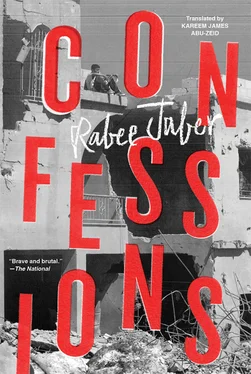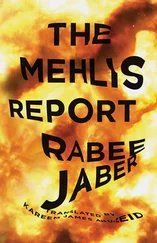Does one change with the passing of time? Ilya — my big brother — used to tell me my father changed from one person to another in a single night and day. “In a single night and day”—I haven’t forgotten my brother’s expression — it’s remained etched in my memory, and I recalled it at different hours of my life: I often remembered this expression because I thought that I too — like Ilya and my father — had changed in a single night and day. Ilya didn’t say my father had turned from a man into a beast — others said that. Ilya later told me a lot of horrifying things. Ilya had changed, too, when he heard those things. People we knew who had relatives in our neighborhood, people who spent time in the Sioufi district, had seen my father in Jisr al-Basha. They said they were passing by that part of town and when they saw my father they couldn’t believe it was him. But it was him. He was forcing people out of their cars and beating them. He was shooting them and throwing them off the bridge.
Ilya used to tell me these things, his voice unwavering, unshaken. That was a long time ago, but when he told me, it felt like no time had passed: was it true that all those years had passed? We were in the Rizq Hospital — it was quiet that night. My father was in the operating room, and my brother was speaking. I didn’t know if I’d ever see my father alive again. Meanwhile, my brother was telling me about that “beast” on the bridge in Jisr al-Basha and in the Tel al-Zaatar and Karantina districts. My sisters had gone and would be back in an hour (the doctor said the operation would take a long time), and Ilya started to speak. I don’t know what came over him. I don’t know what I was thinking when I heard his words, but I knew the place had changed: as he spoke, the chairs in the waiting room vanished, the door that opened out onto the balcony vanished, and the ancient trees disappeared as well — everything vanished: the statue at the end of the corridor, the white walls, the life I had known. I no longer knew where I was. I was supposed to be in the waiting room, it was supposed to be nighttime, and the sick were supposed to be sleeping in identical beds inside identical rooms. This balcony was supposed to look out over tall trees (cypresses? evergreens?) in the hospital’s central courtyard, over there in Achrafieh, that part of town that I knew like the back of my hand. We were supposed to be there, my brother and I, and in a little while my sisters were supposed to return: we were supposed to be waiting for my father, waiting for him to come out of intensive care. Isn’t that right? Was he still under the knife? Was he still in the hands of the surgeon who my sister knew, whose wife she knew, whose apartment she’d visited in the Berty Building — was he still in the hands of the most skilled surgeon not only in Achrafieh, not only in East Beirut, not only in the whole city, but in all of Lebanon? This must be the waiting room — I know the smell of antiseptics — and I’m with my brother waiting for my father to come out of the difficult operation: they’re opening his head now, they’re in there opening up his head beneath the bright lamps and removing the tumor with delicate instruments. The tumor was pressing onto his ocular nerves, and he was in danger of going blind — the doctor had said — if we don’t remove the tumor it will keep growing and growing until… Until what? Until it becomes larger than his brain?
This isn’t your time, Ilya, this isn’t the time for your memories. Ilya was talking about how my father had, in the span of a single night, turned into someone he did not know. I didn’t understand why he was telling me this now. I always asked him about it, but he had never said anything…. Why was he talking now? Why was he opening his mouth at this precise hour? Why was the dam breaking now and the mud pouring through? I was sinking in that mud.
No one ever spoke in front of me. I always wanted to hear about my little brother, but no one said anything. I waited a long time, a very long time. And they waited till the most difficult hour before they finally told me: I call him my little brother even though he isn’t my little brother. I call him “little” because he stayed that way, because he never grew up, because they killed him while he was still a boy.
No one ever answered my questions. I remember when my sister Najwa broke her leg during the Hundred Days War, after the Two-Year War. In the Hundred Days War, there was so much shelling in Achrafieh that not a single windowpane remained intact in the whole neighborhood. One day, when our house was still shaking from the bombing, my sister disobeyed my mother (my father wasn’t home) and left the sanctuary: she left the living room — a natural, centrally positioned safe room whose only window was blocked off with sandbags. She left the sanctuary and went to the kitchen. She was hungry. She said she’d go grab some bread and a package of cheese, but she was lying. She wanted to climb up into the small pantry above the kitchen to get something sweet: a jar of jellied peaches. In times of danger, she always asked for sweets. She fell off the ladder as she was climbing into the pantry and broke her leg.
Later, I stayed with her while she recovered. She was bedridden and in pain. She would send me to get something for her and I’d come back as quickly as I could. That was when she began feeling my face with her fingers, feeling all over my face as if I were made of glass, and saying that she loved me, saying that she loved me a lot. I was young and didn’t understand. I still don’t understand. She’d touch my face and say, “My darling Maroun, I love you so much, Maroun.” And I’d reply, “I love you too, Najwa, my sister.” Often she’d start to cry. Something deep inside me, something dark and secret and untouchable told me that all of this had something to do with my dead brother — but I couldn’t understand what or why. I was young, and when you’re young you don’t think about such things. You welcome the intense emotion, the passionate touches, you embrace the body that’s embracing you, and you don’t ask yourself too many questions. That love is enough for you, that sweet flood of emotion, that warmth suffices. You ask for nothing more when it’s raining outside, and once the shelling dies down you can hear the wind blowing through the peach tree. Why would you ask for more? I remember the little boy I was, scrawling with a pencil on the cast on the broken leg, and I remember that little boy’s sister, Najwa, with her dimples, Najwa who used to bite into tomatoes as if they were apples, who used to pull that little boy toward her, playing with him and running the white ivory comb through his hair.
“You’re my darling, Maroun.” Her words remain, like honey. When bitterness struck, did her words become bitter too? I want to tell you my story. But it’s hard. You have no idea how hard all this is for me.
Ilya said my father punched himself on the head: “He hit his head with his own hand.” Ilya said my father was holding the telephone receiver with his left hand, and then he lifted his right hand and punched himself on the head. His head reeled from that blow, but he rushed out of the house, still in his slippers — he hadn’t put on his shoes.
It’s important I tell you the story in an orderly fashion, but I keep getting accosted, distracted. I feel powerless, I feel… The images flood in and I’m powerless to stop them. But I’ll try.
In order to tell you my story, I need to start with my little brother. They kidnapped and killed him. He hadn’t reached his tenth birthday when they kidnapped and killed him, when they dumped his body, the clothes all torn, on the road that climbs from the “Museum”—the demarcation line area — to the Hôtel-Dieu Hospital in Achrafieh. One of the Phalangists, a relative of my uncle, recognized the tiny bloody corpse and called my father — but the news would’ve come in even without that man: my father had put up pictures of my little brother at all the hospitals and police stations, he put them up at the offices of the Phalange and the National Liberal Party, he put them up at the Civil Defense Offices and the League building, he gave them to the newspapers, he even passed them out in stores and in the Flippers arcades. Ilya took the pictures and made the rounds to all the shops. And they enlarged the picture as well, and Ilya went off with my father and our cousins: there wasn’t a single wall in all of Achrafieh that didn’t have that picture, not a single wall in the entire area around the demarcation line. They put it up everywhere, and added, beneath the picture, his name and our address and telephone number. Some people called and demanded a ransom — it later became clear that these people had nothing to do with the kidnapping, that they were simply trying to profit from the situation…. But these details are meaningless, only the outcome matters. They called my father from the Phalange office, and then they called him from the Hôtel-Dieu Hospital and told him to come and identify his son. Ilya saw my father punch his head, jump up, and leave the house in his slippers. From that moment on, he was no longer himself — that’s what Ilya said.
Читать дальше












